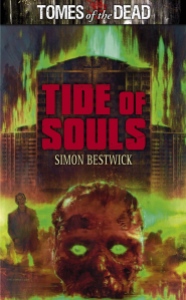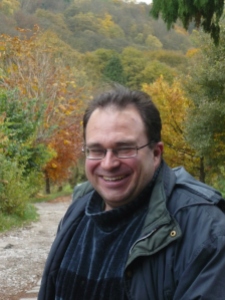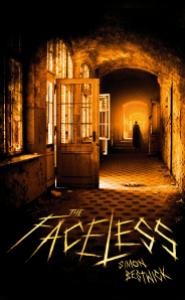What first attracted you to horror writing?
I’ve always loved dark, scary, disturbing fiction. Dr Who on the TV when I was a kid, the Pan and Fontana Books of Horror, the Shaun Hutson novels I read in school- not to mention big thick books of the old, good stuff- Poe, Blackwood, Bierce etc- and anthologies like Ramsey Campbell’s The Gruesome Book. That was probably my first taste of good, contemporary horror fiction- stories like Nigel Kneale’s ‘The Pond’- although I was as grimly fascinated by frog taxidermy as by anything else- August Derleth’s ‘The Extra Passenger’, Henry Kuttner’s ‘The Graveyard Rats’ and David Langford’s ‘3:47AM’, all of which chilled the hell out of me. Not to mention encountering writers like Richard Matheson for the first time. Oh, and then there was Ray Bradbury- The October Country remains one of the best short story collections I’ve ever read, full stop. But that’s Bradbury for you.
Then when I was about eighteen/nineteen years old, I went through a phase of being very ‘arty’ and rejecting all genre fiction as worthless. I was going to write real literature, proper art. Then I looked at the fiction that I’d written and realised that if it belonged anywhere, it was in the horror genre. Closer to Poe’s end of things than Shaun Hutson’s, but horror nonetheless.
That’s the great thing about horror, and probably the core of its attraction- it gives me more creative freedom than any other field of literature I could select. You can give what you’re doing elements of a psychological novel, a social realist novel, you can rope in elements of the crime, thriller, noir, science fiction or fantasy genres (and pretty much any others you can think of.) As I’ve said before, a genre gives you a toolbox which lends itself to exploring certain themes. I’ve heard it argued this automatically makes genre fiction inferior to ‘literary fiction’ (I hate that term as it implies that any fiction put on the genre shelf, by definition, has no literary merit) which is, to put it bluntly, horseshit. If you’re a good writer, you use the tools you need for the job. That’s how you develop your own style and approach and discover what it is you’ve got to say.
 What is your most notable work?
What is your most notable work?
Depends how you’re defining ‘notable’. If you’re talking in terms of the work that’s made the biggest and widest impact, that would probably be my first novel, Tide of Souls, simply because more people read it. Close second to that would be a novella of mine called ‘The Narrows’, which was first published in a Pendragon Press anthology called We Fade To Grey and reprinted in Ellen Datlow’s Best Horror Of The Year. It also led to the following conversation with the lovely American writer Lynda Rucker at World Horror 2010:
LYNDA: I know your name from somewhere… in a good way, I mean. What would I have read of yours?
ME: (thinking: not Crimewatch, then) Well, I’ve been in a couple of Ellen Datlow anthologies… I had a story called ‘The Narrows’ reprinted in-
LYNDA: YOU WROTE ‘THE NARROWS’?!
ME: (only slightly terrified) Um, yeah.
LYNDA: You gave me nightmares for a week!
ME: Oh, sorry-
LYNDA: No, don’t apologise, it was great…
If you mean what I think is my best work so far… I’m certainly not ashamed of Tide of Souls, but the book I’m proudest of to date is my second collection, Pictures Of The Dark. It basically sums up my first ten years as a writer and contains a lot of work I’m immensely proud of. As regards single works, ‘The Narrows’ is a very close contender- from a purely technical standpoint I think it’s my best piece- but at the top I’d probably go for another novella called ‘The School House’ which I wrote for a BFS anthology called Houses on the Borderland– it’s probably the most personal and intense thing I’ve written, and there were a couple of times during the writing of it that I feared for my sanity. Which shows, I think, in the story.
A new novel, The Faceless, which will be out from Solaris Books early next year. The first draft is complete, and now the process is basically a mixture of intensive rewriting and a lot of research to get small but vital details right. It’s a supernatural novel set in the North of England, where a bunch of sinister creatures called the Spindly Men start haunting the streets and people start to vanish. Apart from that, I’ll just say that the trail leads to a place called Ash Fell and that there’s something pretty terrible- and hopefully unexpected- waiting there. Also, I’ve got a new collection called ‘The Condemned’ coming out from Gray Friar Press in October- ‘The Narrows’ and ‘The School House’ will both be reprinted therein.
Who do you admire in the horror world?
Ramsey Campbell has done more than any other living writer to promote horror as an honourable field to toil in, as a branch of literature rather than its gutter. Joel Lane is one of the finest short story writers in the genre (I would love to see a supernatural novel from him) as well as a fine editor and one of its most insightful and intelligent commentators. Gary McMahon, Adam Nevill and Conrad Williams are three of the best of the new wave (hopefully I can try and surf alongside them), Cate Gardner is one of the most individual and offbeat voices in the field. Paul Finch is a real stalwart of the genre, a great storyteller in the best sense of the world, and a very British writer as well; his work is so solidly rooted in British folklore and everyday life in this country that he couldn’t be from anywhere else, or be mistaken for anyone else. Also there are writers like Jasper Bark, Rebecca Levene, Paul Meloy… I’ll stop before I go on all week. And I should also mention Jon Oliver of Solaris Books. He’s a bloody good editor both of novels and anthologies and one of the nicest guys I’ve so far met in publishing – plus he has a genuine knowledge of and love for the genres he publishes. God knows, that’s the kind of person we need working in publishing (He also has great taste, because he publishes me).
Do you prefer all out gore or psychological chills?
I’ve been known to use both. Generally, I’m trying to write something disturbing and unsettling, rather than just splash buckets of gore around. But a gruesome or explicit scene can be very unsettling if it’s actually about something other than a body being disassembled. The opening chapter of Derek Raymond’s I Was Dora Suarez is very graphic in its depiction of violence, and it’s terrifying- it rams home the appalling reality of a violent death (as does the description of a murder victim at the opening of another Raymond novel, He Died With His Eyes Open) and it shoves you right into the head of the psychopath responsible. Meanwhile, Conrad Williams creates a sort of terrible, beautiful poetry out of atrocities. I’ll go for subtlety wherever possible, but equally you can’t flinch from depicting violence or cruelty accurately where that’s necessary.
Why should people read your work?
To keep me off the streets and out of trouble? Failing that, because it’s… oh lord, do I have to do this? I’m partly English… blowing my own horn doesn’t come naturally. On the other hand, perhaps my Welsh genes will come to the rescue here. Because it’s bloody good- dark, powerful, engaging, frightening, thought-provoking and something that will leave you moved, disturbed, perhaps even exhilarated, but never feeling short-changed. Just read something of mine and you’ll see.
Recommend a book.
Horror or non-horror? I’ll cheat and do one of each.
Most of the people I’ve name-checked above are all pretty well-known to aficionados of the genre, so I’ll recommend Cate Gardner’s collection Strange Men In Pinstripe Suits as I think everyone should have a copy. Dark, quirky, blackly funny stories of enviable brevity tinged with the feel of fairy tales and fables. One of my favourite reads of last year.
And one that isn’t really anything to do with the horror genre, but is still one of my favourite ever novels- The Therapy Of Avram Blok by Simon Louvish. By turns comic, tragic, surreal and knockabout, freewheeling and madcap in form, it traces the journey of a young man growing up in Israel after its inception, coming of age in the 60s and ploughing his furrow at home and abroad. The sequel, City of Blok, set wholly in Jerusalem around the time of the Lebanon War, is just as good and may even be better. I really don’t know of another author quite like Louvish- he’s fantastic and hugely underrated, and you can track the Blok novels down very easily on Amazon.




















